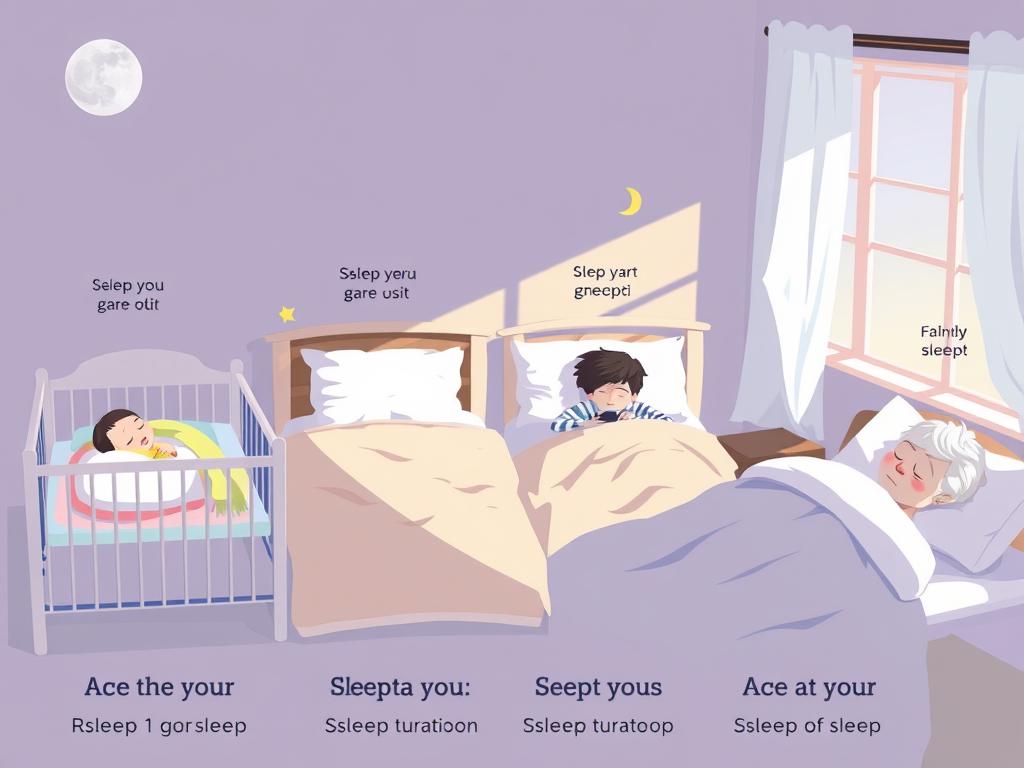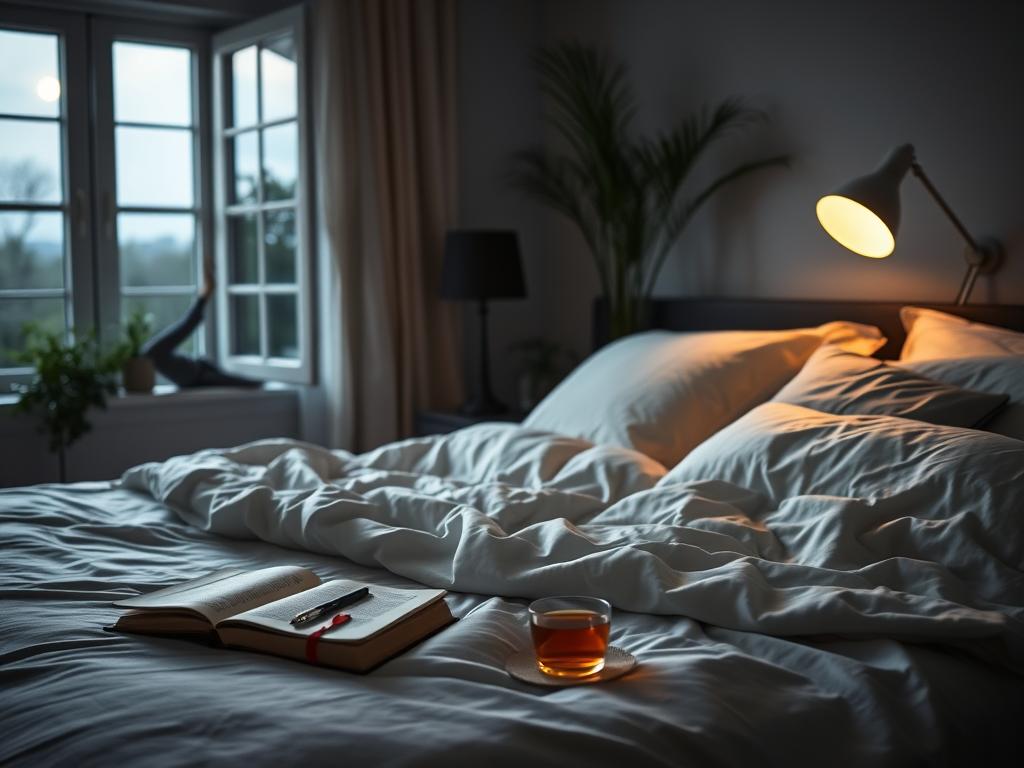Did you know that chronic sleep deprivation can increase the risk of serious health issues, including heart disease and obesity? In fact, more than two-thirds of individuals in a comprehensive study by the Sleep Foundation reported experiencing poor sleep for extended periods. Understanding the secrets to healthy sleep is critical for your overall well-being, as most adults require at least seven hours of rejuvenating slumber each night, but not exceeding eight hours for optimal health.
This article delves into how much sleep you need and how to improve it, highlighting the impacts of various age groups, lifestyle choices, and natural remedies. Whether you’re battling insomnia or just looking to enhance your better sleep habits, knowing the fundamentals can lead to significant improvements in your sleep quality and, consequently, your quality of life. So, let’s explore the fundamentals together!
Key Takeaways
- Most adults need a minimum of seven hours of sleep for optimal health.
- Chronic sleep deprivation can lead to serious health issues like heart disease and depression.
- Regular exercise can improve sleep quality but should be avoided close to bedtime.
- Creating a dark sleeping environment is essential for better sleep.
- Caffeine and alcohol consumption should be limited hours before bedtime to maintain sleep quality.
- Staying consistent with sleep schedules positively affects long-term sleep quality.
- Relaxation techniques like mindfulness can significantly enhance sleep quality.
Understanding Sleep Needs Across Different Ages
Understanding the varying sleep needs throughout different life stages is crucial for overall well-being. Sleep duration recommendations establish the foundation for optimal sleep hours, tailored to individual age groups. While the general requirements provide guidance, personal factors play a significant role in determining the right amount of rest.
Infants to Toddlers: The Importance of Consistent Sleep
Newborns require 14-17 hours of sleep per day, while infants aged 4-11 months need 12-15 hours to support their rapid growth. Sleep helps in bonding and cognitive development. For toddlers, the sleep requirement ranges from 11-14 hours daily. Consistent sleep patterns contribute positively to their health and development, especially during these formative years. Adopting healthy sleep tips can aid parents in establishing good habits for their children.
Children and Teenagers: Growth and Sleep Requirements
School-aged children should receive 9-12 hours of sleep each night, emphasizing the connection between adequate rest and their cognitive abilities. Teenagers, too, have substantial sleep needs, ranging from 8-10 hours. Growth spurts and hormonal changes during adolescence can affect sleep quality, making it essential to prioritize rest for physical and mental health.
Adults: Finding Your Optimal Sleep Duration
For most adults, reaching 7-9 hours of sleep per night is necessary for maintaining health. Sleep deprivation can increase stress levels and impact mood negatively. Adults should strive to create a sleep-conducive environment that allows for restful nights. Personal circumstances such as work schedules and lifestyle choices may necessitate adjustments in sleep duration recommendations.
Older Adults: Sleep Changes and Recommendations
Older adults often require 7-8 hours of sleep, yet they may face changes in sleep patterns such as fragmentation and lighter sleep. Maintaining a regular sleep schedule can improve sleep quality, contributing to better overall health. Irregular sleep can lead to serious issues, highlighting the importance of adhering to mostly consistent sleep schedules. Learning about healthy sleep tips relevant to this age group can provide necessary support for improved rest.

The Science Behind Healthy Sleep Patterns
Understanding sleep involves diving deep into the intricate cycles that govern the restorative process of our bodies. Each night, we go through sleep stages that play vital roles in our physical and mental health. Grasping the concepts of REM and Non-REM sleep not only helps to improve sleep quality but also illustrates why focusing on sleep quality vs sleep quantity is crucial for optimal well-being.
Sleep Stages: A Closer Look at REM and Non-REM Sleep
Sleep cycles consist of various stages that last anywhere from 1 to 120 minutes. The four stages include three Non-REM stages and one REM stage. Deep sleep in stage 3 significantly contributes to both physical recuperation and cognitive functions. Meanwhile, REM sleep is essential for memory consolidation and learning, underscoring how these stages work in harmony to enhance overall health.
Circadian Rhythms: Why Your Body Clock Matters
Circadian rhythms, lasting about 24 hours, dictate numerous bodily functions, including sleep-wake patterns. Influenced primarily by light exposure, these rhythms can be easily disrupted by external factors like stress, hunger, or caffeine intake. Maintaining proper circadian rhythms can dramatically improve sleep quality and help individuals feel more energized throughout the day.
Sleep Quality vs. Sleep Quantity: Finding the Balance
Achieving a good night’s rest goes beyond merely clocking in seven to nine hours of sleep each night. The distinction between sleep quality vs sleep quantity is essential. Individuals need to focus on obtaining restorative sleep, with quality being just as critical as the number of hours spent asleep. This balance can enhance physical health and cognitive function. Night shift workers, for instance, can benefit from tips to maintain energy and well-being, ensuring they prioritize both adequate rest and impactful lifestyle choices for improved sleep quality.

Tips to Improve Sleep Hygiene for Better Rest
Implementing effective sleep hygiene practices can significantly enhance your quality of rest. Small adjustments in your routine can lead to better sleep habits that promote overall well-being. Below are some crucial strategies that can help foster a healthier sleep environment.
Create a Sleep-Inducing Environment
Establishing a tranquil sleep environment is vital. Keep your bedroom cool, ideally between 60-67°F (15.6-19.4°C), dark, and quiet. This setup helps signal to your body that it’s time to wind down. Using the bed exclusively for sleep and intimacy strengthens the association between the bed and sleep, making it easier to relax when it’s time to rest.
Establish a Relaxing Pre-Sleep Routine
Engaging in a calming pre-sleep routine can significantly enhance sleep improvement strategies. Aim to begin winding down about 30-60 minutes before sleep. Activities such as reading, practicing relaxation exercises, or meditative techniques promote mental clarity and signal that it’s time to sleep.
Limit Screen Time: The Impact of Blue Light
Reducing exposure to electronic devices before bedtime is essential for better sleep habits. Screens emit blue light that can disrupt melatonin production, making it harder to fall asleep. Aim to unplug at least an hour before you go to bed to allow your mind to relax and prepare for sleep.
Avoiding Stimulants: Caffeine and Alcohol
Caffeine can linger in your system for 3-7 hours after consumption, potentially disrupting sleep patterns. Being mindful of your caffeine intake, especially in the afternoon, plays a crucial role in sleep hygiene practices. Similarly, while alcohol may initially induce drowsiness, it can impair sleep quality later in the night, so moderation is key.

For further insights on managing stress and improving focus, check out this resource. Implementing these strategies consistently will pave the way for improved mental clarity and overall health.
Natural Remedies and Techniques for Better Sleep
Many individuals struggle to achieve quality rest, with over 60 million Americans facing challenges related to sleep. When looking for effective natural remedies, numerous methods can enhance sleep quality without relying solely on medication. Incorporating sleep enhancement techniques can fundamentally change nightly rest and overall well-being.
Herbal Supplements: Chamomile, Lavender, and More
Herbal supplements have gained popularity as effective natural remedies for sleep issues. Chamomile is well-known for its calming effects, often consumed as tea prior to bedtime. Lavender, whether used in essential oil form or as a scent in sleep masks, can promote relaxation and reduce anxiety. Other herbs, like valerian root and passionflower, may help improve sleep quality and decrease the time it takes to fall asleep.
Mindfulness and Meditation for Sleep Enhancement
Practicing mindfulness and meditation can play a significant role in developing better sleep habits. These techniques promote relaxation and reduce racing thoughts, aiding the transition into sleep. Simple breathing exercises or guided meditation can ease stress levels, leading to a more restful night. Engaging in mindfulness regularly can create a habit that prepares the mind for sleep, ultimately enhancing sleep quality.
The Role of Exercise in Promoting Good Sleep
Incorporating regular physical activity into one’s routine can significantly influence sleep patterns. Exercise helps regulate the production of melatonin, a hormone that assists in achieving a restful state. Engaging in activities like walking, swimming, or yoga can ease tension throughout the day. It is advisable to avoid vigorous workouts close to bedtime, as they might interfere with the ability to fall asleep quickly.
| Technique | Description | Benefits |
|---|---|---|
| Chamomile | Herbal tea known for calming effects. | Reduces anxiety; promotes better sleep. |
| Lavender | Essential oil or scent in sleep aids. | Enhances relaxation; improves sleep quality. |
| Mindfulness | Breathe and focus techniques before bed. | Decreases stress; prepares mind for sleep. |
| Exercise | Regular physical activity done earlier in the day. | Improves sleep patterns; enhances melatonin production. |
Recognizing Sleep Disorders and When to Seek Help
Understanding common sleep disorders is essential for maintaining overall health. Insomnia, sleep apnea, and restless legs syndrome are among the prevalent conditions that disrupt sleep. Insomnia, characterized by difficulty falling or staying asleep, affects a significant portion of the population and can lead to persistent fatigue. Sleep apnea and restless legs syndrome also contribute to a restless night, underscoring the importance of recognizing the signs that indicate a need for professional assistance.
Common Sleep Disorders: Insomnia, Sleep Apnea, and Restless Legs
If you notice symptoms such as loud snoring, chronic difficulty with sleep, or a pattern of restless behavior at night, it may be time to consult a sleep specialist. These experts can conduct assessments like polysomnograms to diagnose various sleep disorders accurately. With an estimated one in three adults suffering from insomnia, proper evaluation is crucial to addressing underlying causes, which may include medical conditions such as anxiety, depression, or chronic pain.
Signs You Should Consult a Sleep Specialist
Identifying when to seek help can make a significant difference in managing sleep disorders. Cognitive Behavioral Therapy (CBT) is often recommended as a first-line treatment for long-term issues like insomnia, as it addresses root causes rather than merely relieving symptoms. Integrating therapies and lifestyle changes into your routine, such as relaxation techniques or improving your sleep environment, can foster better sleep quality. It’s essential to take your sleep health seriously, as it is a vital part of overall wellbeing.
Treatment Options: Therapies and Lifestyle Changes
While prescription medications are available, they might not be the best long-term solution due to risks of dependence and side effects. Many sleep specialists advocate for lifestyle adjustments and cognitive-behavioral approaches as effective alternatives. With proper treatment, including the right combination of therapies and lifestyle changes, many sleep disorders can be effectively managed, helping to reclaim the restful nights we all need.











